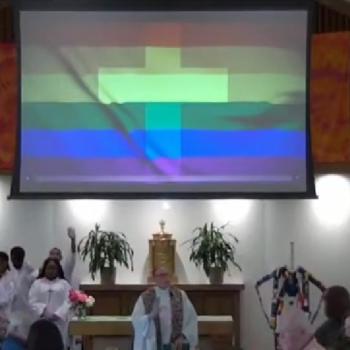Guest writer: Eric Luppold.
Introduction
I want to thank Dennis for his response, and I believe that we are drilling down to some key points. If I had to summarize what I believe the issue to be, it is a fundamental disagreement on interpretive authority. That is, Scripture can be said to be fully sufficient, but it does not matter if the message cannot get from God’s book to our brains. Dennis therefore argues that Scripture does not “possess within itself enough clarity to exist without the need for external interpretive authority.”
Bridging the Gap
While I would affirm that there is a gap between the Bible and man’s understanding, that gap is the result of the Fall. The noetic effects of sin – sin’s effect on our ability to reason rightly – is a genuine obstacle. But who can overcome it? The Roman Catholic Church claims that it – the Magisterium – must occupy the space between the Bible and the believer. In doing so, its interpretive decisions cannot be validated, challenged, or corrected. If one were to question the current Magisterium by citing Scripture, the Magisterium would say that it gets to decide what writings count as Scripture and what those writings mean. If one were to then cite a tradition or church father, the current Magisterium would say that it gets to decide which traditions are authoritative traditions and what those church fathers mean. The result is an untouchable and uncorrectable Magisterium – Sola Ecclesia.
The Holy Spirit as Interpretive Authority
Yet when we look at both Scripture and history, we see that the Holy Spirit serves as the external authority that opens the mind of believers (Acts 16:14) and leads them to rightly handle the word of God (2 Timothy 2:15). Aside from the fact that Jesus and the Apostles always cited Scripture to the Pharisees and Sadducees (i.e., the Jewish Magisterium) with the expectation that they could grasp its meaning, we have explicit teaching on this matter in 1 Corinthians 2. After reminding the Corinthian Christians that he had proclaimed the gospel to them, Paul says the following in verses 10 through 13 (emphasis mine):
These things God has revealed to us through the Spirit. For the Spirit searches everything, even the depths of God. For who knows a person’s thoughts except the spirit of that person, which is in him? So also no one comprehends the thoughts of God except the Spirit of God. Now we have received not the spirit of the world, but the Spirit who is from God, that we might understand the things freely given us by God. And we impart this in words not taught by human wisdom but taught by the Spirit, interpreting spiritual truths to those who are spiritual.
We see here that the Holy Spirit serves as the ultimate external authority that reveals and interprets spiritual truths. As Paul says later, it is those who have the mind of Christ that truly understand (1 Corinthians 2:16). Note that these statements by Paul sit between Chapters 1 and 3 where, in both places, Paul chastises the Corinthians for saying things like “I follow Paul” or “I follow Cephas.” His answer to such divisions is not to turn to Cephas (i.e., Peter) as the Pope, but to seek wisdom from God.
Regarding Vincent
Allow me to briefly say a few things about Vincent of Lerins. First, Dennis seems to assume that Vincent is authoritative. But who decided that this represents the correct position? Could Vincent be wrong? How would anyone know? Second, I recommend that everyone read Vincent’s Commonitorium, as I believe it to be useful and not as favorable to the Roman Catholic position as one might think.
Keep in mind that, when reading any early church father, we must avoid engaging in anachronism. For many modern readers, when they see the word “Catholic” in an ancient text they often assume it refers to the modern Roman Catholic Church. But that is an unwarranted jump. For example, Vincent describes the Catholic faith as “that faith which has been believed everywhere, always, by all. For that is truly and in the strictest sense Catholic.”
Then, when he talks about how to handle disagreements over Scripture, he does not appeal to the Pope but says that we must follow the rule of “universality, antiquity, and consent.” In describing how this rule is applied, Vincent says the following:
The Church of Christ, the careful and watchful guardian of the doctrines deposited in her charge, never changes anything in them, never diminishes, never adds, does not cut off what is necessary, does not add what is superfluous, does not lose her own, [and] does not appropriate what is another’s…
After reading that statement, I find it hard to believe that Vincent would affirm modern dogmas such as Papal Infallibility and the Bodily Assumption of Mary.
Conclusion
In closing, I want to address Dennis’s question to me regarding disagreement between believers. While I have previously shown that Scripture allows for disagreements in certain areas, I believe that Augustine summarizes it well in On Christian Doctrine, Book I:
Whoever, then, thinks that he understands the Holy Scriptures, or any part of them, but puts such an interpretation upon them as does not tend to build up this two-fold love of God and our neighbor, does not yet understand them as he ought. If, on the other hand, a man draws a meaning from them that may be used for the building up of love, even though he does not happen upon the precise meaning which the author whom he reads intended to express in that place, his error is not pernicious, and he is wholly clear from the charge of deception.
Augustine, both here and elsewhere, sets forth several principles of interpretation common to all forms of communication, such as authorial intent. To rightly handle God’s word, the regenerate person will utilize such principles – albeit imperfectly. True spiritual unity – not a man-made façade – is brought about by the Holy Spirit as Christ sanctifies his people (individually and corporately) in truth through the word (John 17:17).
Thank you!
Read The Latin Right’s other writing here.
Please visit my Facebook page and IM your questions (and follow my page) or topics for articles you would like covered.
Also, please subscribe my YouTube page for updates on upcoming articles.














